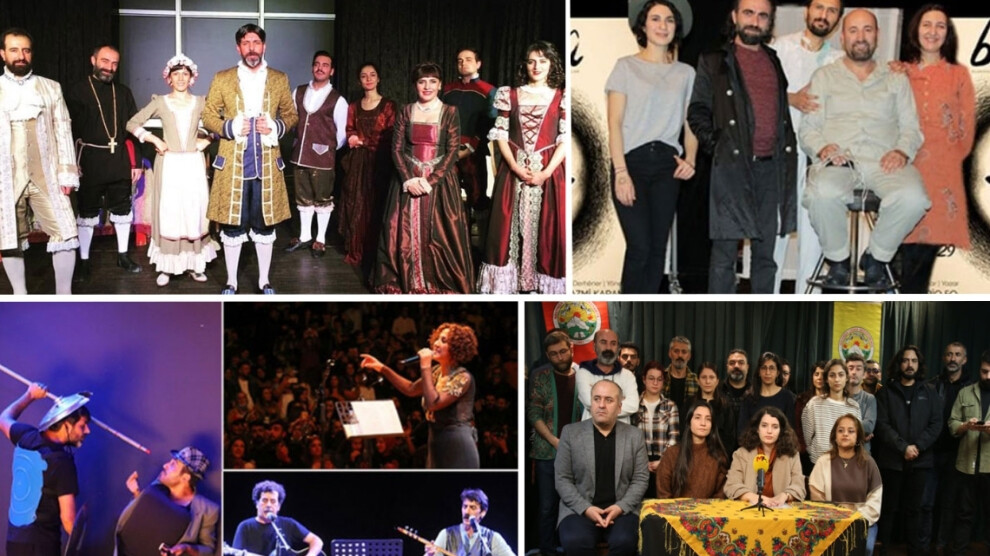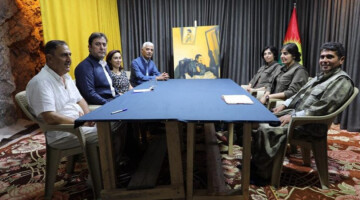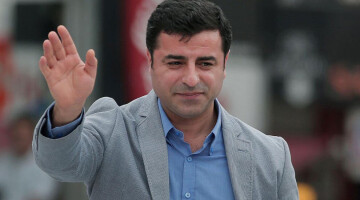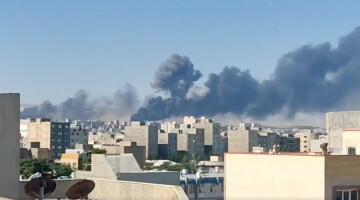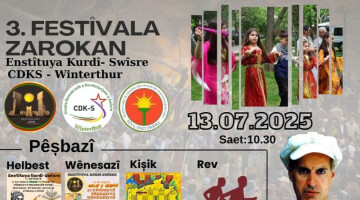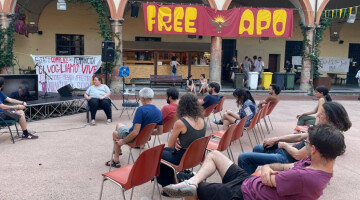The United Nations Educational, Scientific, and Cultural Organization (UNESCO) General Assembly declared February 21 as "World Mother Language Day" in 1999. This day has been celebrated annually since 2000.
While Turkey's official monolingual policy has persisted for years, the Kurdish language and culture have continuously faced pressure. This suppression has been part of the denial policy since the founding of the Republic, extending to practices and prohibitions against the mother tongue. The pressure on the Kurdish language and culture has been felt in various areas throughout different periods. The situation became more systematic with the declaration of the State of Emergency in 2016. Several Kurdish institutions, including the Azadiya Welat newspaper, Tîroj magazine, Kurdish Language Research and Development Association (KURDÎ-DER), Istanbul Kurdish Institute, and Kurdish language schools like Ferzad Kemanger, Ali Erel, and Ahmet Beyhan, were closed down by decrees.
Banned concerts and plays
To date, concerts by Kurdish artists such as Mem Ararat, Azad Berdan, Zinar Sozdar, Metin Kemal Kahraman, Aynur Doğan, and the Mesopotamia Cultural Center (MKM), as well as Kurdish theater plays and shows like Bêrû, Dawiya Dawî, Mem û Zîn, Don Kîxot, Tartuffe, Haylo Dîsa Tevlıhev Bû, have been banned without explanation.
MLSA appeals to the Council of Europe
The Media and Law Studies Association (MLSA) Legal Unit has reported to the Council of Europe regarding the implementation process of the European Court of Human Rights’ (ECtHR) decision in the "Ulusoy and Others" case, which found the banning of Kurdish concerts and theater events to be a violation of rights. The report highlighted the government's attempt to remove Kurdish from the public sphere and listed Kurdish artistic events banned in Turkey since 2019.
'Arbitrary bans by governors must end'
The MLSA stated that the authority granted to governors and district governors to ban gatherings should be restricted and the Law on Meetings and Demonstrations (No. 2911) needs to be amended accordingly. It emphasized that without addressing these arbitrary bans, a real solution to the problem cannot be achieved.
Qral û Travîs banned
Recently, during the celebrations of World Mother Language Day, the Qral û Travîs tour was banned without justification on January 23 in Ağrı, February 10 in Antep, February 16 in Istanbul, and February 18 in Adana. Actors were removed from the stage, and audiences were prevented from entering the theater. The actors were forcibly removed from the hall. Actor Bahoz Özsunar's sibling and actors protesting outside the Şişli Cemil Candaş Cultural Center were detained.
MKM Artist Engin Cengiz, Qral û Travîs Theater actor Deniz Özer, and lawyer Emine Özhasar shared their insights with the Media and Law Studies Association regarding the bans on theater and concerts.
Özer: Intolerance is evident
Deniz Özer, who stated, "We do not recognize bans; we will play on the streets, avenues, and houses if necessary," commented that the ban decision indicates intolerance towards the Kurdish language. Criticizing politicians' statements that "there is no pressure on the Kurdish language," Özer expressed outrage at the bans, saying, "They say there is no pressure, but we see that there is. What about the games that are banned for no reason?" Özer also stated they would continue their insistence on Kurdish theater plays and would appeal against the ban decisions, saying, "We will follow up until we win."
'Bijî şanoya Kurdî' (Long live Kurdish theater)
Regarding the ban decisions and AKP Istanbul mayoral candidate Murat Kurum's few words in Kurdish and his traditional Kurdish dance, Özer said, "Those who ban my play in my language know how to use it when needed." On World Language Day, Özer emphasized, "Languages show cultures and differences, which is why they are ancient and valuable. I want to say this in my mother tongue: Bijî Zimanê Kurdî (long live the Kurdish language), Bijî Şanoya Kurdî (long live Kurdish theater). I thank everyone who did not leave us alone."
Cengiz: A banning mentality
MKM Artist Engin Cengiz expressed his views:
"Firstly, let me state that the current system sustains itself through bans, be it concert bans outside or domestic bans on women's rights. Obviously, this banning mentality primarily attacks the most resistant sectors, especially the Kurdish people's culture and political struggle, and the cultural field is systematically and intensely attacked. Culture means society, and destroying culture means destroying society; it's a reflection of colonialist policy.
In Turkey, the banning mentality has sidelined fair trials and even the laws they have established themselves. We are experiencing a consequence of a monolithic system. Law and rights are now obsolete, and the problem, I believe, has surpassed a point that can be resolved by the judiciary. Society must say stop because laws are not being applied, and even the law is illegal. Only through social struggle can this be overcome.
Reaction to pressures on MKM
MKM was established and has sustained itself by paying great prices in the Kurdish people's freedom struggle. It owes this to its societal values and combative spirit. The system knows MKM is not just a few individuals or a place; it's the home, voice, and essence of the entire society. That's why the approach is harsh, and it clearly states that if you want to advance and become popular in art, don't go to MKM. Of course, we won't accept this, and we will carry our struggle to a stronger point, more societal and touching the spirit of the time.
The system, with all its apparatuses, is intensively trying to assimilate Kurdish language and society. The system's existence and continuation depend on Kurdish nonexistence and assimilation. There are powers benefiting and sustaining themselves from this process. They know that without language, there's no society, and without culture, there's no society. We, the Kurdish people, must oppose this assimilation with all our might. At home, in the streets, in business, at school, we must fight, knowing this fact, to prevent the last incomplete genocide in history. We must find new and rich methods. The system has disadvantages as much as advantages; we must focus on these, especially in reaching the society.
Bans are arbitrary
For the past three years, our concerts and theaters have been banned, and we have court decisions to overturn these. This situation raises the question, 'Why are they banned again?' First, the system's mentality doesn't change. The second reason is the negligible sanctions and societal inaction. For example, if there was a strong reaction to the banned MKM concert, the play arbitrarily banned by Şişli District Governorate wouldn't have happened, nor would Bêrû and other plays and concerts. These bans are entirely arbitrary; our people and art lovers should know this, and if we strongly support, we can fight this, or else there's a high likelihood of continuation."
'Decisions are political'
Lawyer Emine Özhasar also shared her thoughts:
"Unfortunately, the decisions to ban Kurdish concerts and theater are politically motivated. The ban decisions lack legal grounding, and previous court decisions regarding the bans are not considered. In a lawsuit we filed regarding MKM's concert ban, the Istanbul 6th Administrative Court referred to the Constitution's Articles 13 on 'Fundamental rights and freedoms,' 26 on 'Freedom of expression and dissemination of thought,' and 27 titled 'Freedom of science and art,' and decided to overturn the ban and accept the claim for material compensation. Despite this decision, ban decisions continued to be issued. The attempts to criminalize the Kurdish language through bans cannot be explained by law. Despite all these, we will continue our legal struggle against the ban decisions."
Source: MLSA (Media and Law Studies Association)

